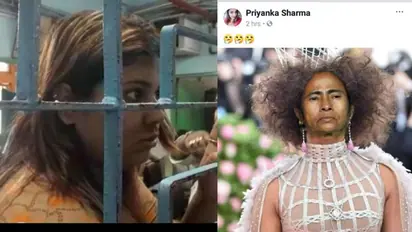
Having to apologise to walk out of jail seems a light trade-off. But when one is made to grovel for a meme or caricature of a politician, it strikes at the heart of a free nation’s soul and already dwindling sense of humour.
The Supreme Court’s decision to make BJP worker Priyanka Sharma apologise at the time of release on bail for sharing a meme on Bengal CM Mamata Banerjee is egregious. The order is dismaying in its lack of vertebrae, and stunning in setting a precedence. It is a sad day for cartoonists, caricaturists and new India growing and vibrant community of meme-makers.
Kamlesh Tiwari, who went to jail for 'insulting' the Prophet
While Mamata has been particularly touchy and savage towards criticism and people making fun of her, most parties have shown extreme lack of tolerance for free speech. Scientists and opinion-maker Anand Ranganathan’s two meticulously curated threads of tweets, for instance, show how both the Congress and the BJP have repeatedly used it against artistes and other citizens.
It is perfectly democratic to oppose cartoons vocally on social media or even or on the streets, but to employ legal grey areas to stifle creative criticism is vulgar, autocratic use of law and power.
Laxman on Indira
Laxman on Indira and Emergency
Laxman on Bal Thackeray
Satish Acharya on Modi
Satish Acharya on Modi
Ajmal Husain on Gandhi and Nehru
Vasu on Jinnah as nautch girl
Also read: Supreme Court to release Priyanka Sharma only if she apologises for Mamata meme
The tradition of politicians getting offended by cartoons is long and murky. Jawaharlal Nehru got miffed by Ajmal Husain’s cartoon in Dawn on ‘Gandhi the sorcerer’ and asked Sardar Patel to look into it. Mahatma Gandhi himself was not amused by Shankar Pillai’s unflattering depictions of Muhammad Ali Jinnah.
Enver Ahmed’s confused Jinnah, Vasu’s Jinnah as a nautch girl and Amrita Bazaar’s Jinnah as shoe-shine boy raised a fair amount of dust and controversy.
But while politics did what politics does, the judiciary has often played it safe and wriggled out of strongly batting for freedom of speech and expression guaranteed under Article 19. The arrest and jailing of cartoonist Aseem Trivedi, or the incarceration of RSS man Kamlesh Tiwari for ‘insulting the Prophet’, are among hundreds of cases in which judicial system could have shown some spine.
Also read: Liberal Mamata can't stand spoof, arrests BJYM cadre Priyanka Sharma
The greatest enemy of free speech lies within Article 19 itself: Article 19(2), which imposes “reasonable restrictions”.
These restrictions range from the serious security and sovereignty of the State to a lot more ambiguous “decency and morality” and “defamation and incitement of an offence”.
One of the first germs of nebulous restrictions to freedom of speech and expression was in the Motilal Nehru Committee Report of 1928.
It states: “The right of free expression of opinion, as well as the right to assemble peaceably and without arms, and to form associations or unions, is hereby guaranteed for purposes not opposed to public order or morality.”
The issue of the extent of freedom of speech independent India must offer was hotly and brilliantly discussed in the Constituent Assembly debates.
“I attach great importance to association and to free speech. It is through them that we can make our voice felt by the government, and can stop the injustice that might be done to us,” said Sardar Bhopinder Singh Man from East Punjab. “For attaining these rights the country had to wage so many struggles, and after a grim battle succeeded in getting these rights recognised.”
Then he fiercely defended that right. “But now, when the time for their enforcement has come, the government feels hesitant; what was deemed undesirable then is now being paraded as desirable. What is being given by one hand is being taken away by the other. Every clause is being hemmed in by so many provisos… To apply the existing law in spite of change conditions really amounts to trifling with the freedom of speech and expression,” he argued.
His words were prophetic. The polity has got more and more brazen in subverting Article 19, and the judiciary has opted for the politically ‘safe’ bylanes that its sub-clauses provide.
It is leading us to a throwback of the colonial era when one could not draw a British man extorting an Indian or an Indian person chasing or overpowering a British man.
What is at stake is India’s rich tradition of lampooning in art, music and cinema; its hasya ras.
Would the honourable judges have asked RK Laxman to apologise for his irreverent cartoons on Emergency, Bal Thackeray, Rajiv Gandhi or Atal Bihari Vajpayee? Judges will sit in judgment, but their judgments must rise above mediocrity.